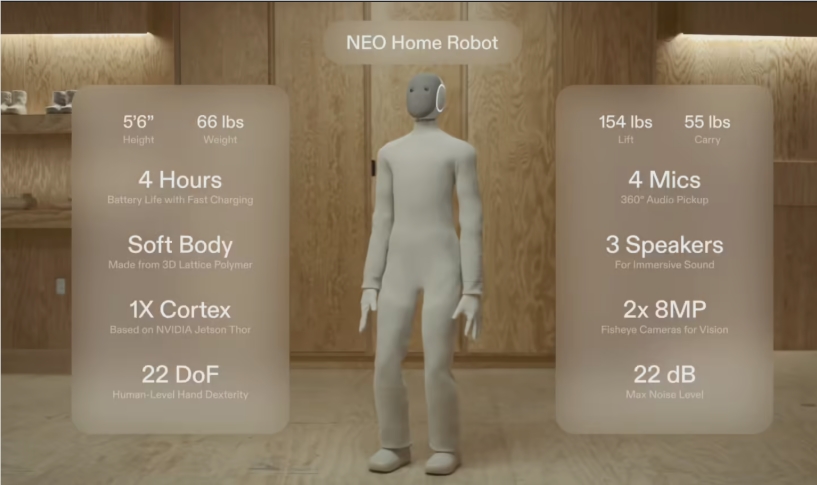Recently, Norwegian robotics company 1X, backed by the OpenAI Startup Fund, has officially launched the global pre-sale of its first home humanoid robot, Neo, priced at $20,000 (approximately 142,000 RMB), and also introduced a monthly subscription service costing $499. This 1.68-meter-tall, 30-kilogram robot is touted as the world's first humanoid assistant designed specifically for home use, aiming to tackle daily chores such as dishwashing, organizing, and watering plants, with the goal of completely freeing humans from household tasks.

Capable but Needing "Support": A New Model of AI + Remote Human Collaboration
1X Neo has basic household task execution capabilities: users can issue commands via voice or a mobile app, and it can complete tasks such as cleaning the dishwasher, organizing items, and tending to plants. One charge allows continuous operation for 4 hours, and it is equipped with a camera that supports remote viewing, meeting users' needs for real-time monitoring.
However, when faced with complex or unconventional scenarios, Neo's AI is still insufficient to handle independently. To address this, 1X has innovatively introduced a "Expert Mode" — when the robot encounters difficulties, after user authorization, remote operators in the background will access through VR headsets and take control in real time to assist with the task. This means that Neo is not fully autonomous but rather a hybrid intelligent system combining AI and human experts.
Privacy Controversies and Security Commitments: How to Protect Home Data?
This remote control mechanism has also raised concerns about user privacy. In response, 1X has clearly committed:
- Remote operators cannot see family members' faces or identities; video streams are automatically blurred in real time by AI;
- Users can set restricted areas (such as bedrooms and studies), and the robot will not enter these areas;
- All remote interventions must be authorized by the user, and the entire process is traceable and revocable.
The company emphasized that privacy protection is a core principle of product design, and all data is encrypted locally, never used for model training.
Supported by OpenAI, Home Robots Enter the Commercialization Era
1X completed a $23.5 million Series A2 funding round this March, led by the OpenAI Startup Fund, demonstrating its recognition of the long-term value of embodied intelligence. Neo is planned to be delivered first in the United States in 2026, and expanded globally in 2027. Although the $20,000 price tag is still high, compared to research-grade humanoid robots that cost tens of thousands, Neo has taken a crucial step toward consumerization.
Industry analysts point out that the true significance of 1X Neo lies not in "fully replacing humans," but in verifying the feasibility of humanoid robots in real home environments. When AI, mechanics, human-robot collaboration, and privacy security all come together in a living room, we may be standing at the beginning of the era of "robots entering homes."
The future is here, it's just not yet widespread — and your first household robot might be closer than you think.










